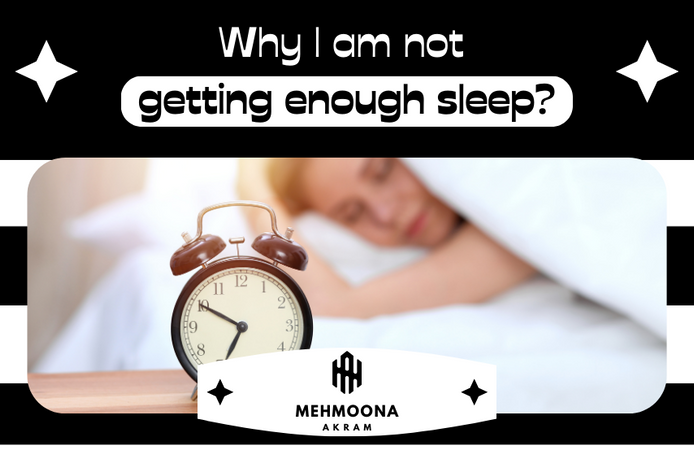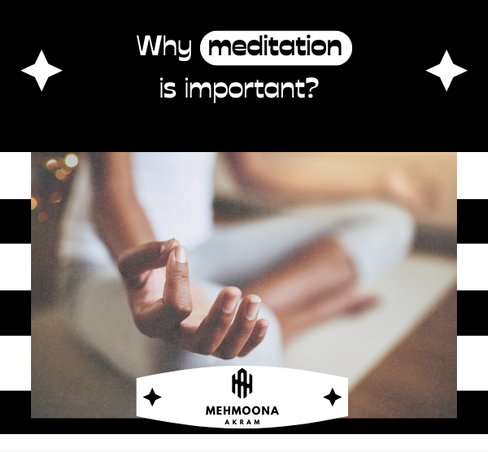
Why I am not getting enough sleep?
As a writer, I faced several deadlines and spent many hours looking at my computer screen, trying to find the proper words to put on paper. Unfortunately, this resulted in a lot of sleepless nights, which made me realize how stressful and irritating the feeling of insomnia is. We can’t sleep sometimes even after lying in bed for hours. If you’re like me and going through this stage of life, you’re probably experiencing difficulties since you didn’t get enough sleep and can’t even relax during the day. You spend the entire day frustrated with work, bored, and wanting to sleep. So, in this essay, I’ll provide some insights about insomnia, such as what causes it and how we might treat it.
Importance of sleep:
As we all know, sleeping is considered brain fuel. As the body requires sustenance for healthy functioning, balance, and maintenance, so does the brain. Sleeping is a key element of our lives, and it is critical to our physical health, cognitive function, and emotional well-being. If we do not get enough sleep, we may experience mental distress as well as some serious brain illnesses and disorders, as we discussed above. For some people, this fuel remains a dream, and they are forced to rely on sleeping pills, which may provide temporary relief but are extremely dangerous to our body’s functioning and metabolism. So, first, let’s talk about why we can’t sleep.
- Stress and Anxiety: Insomnia is a major cause of not getting enough sleep. Stress over life, career, and so on is a major contributor to sleep disruption in anxiety episodes. In our chaotic environment, it is extremely tough to manage finances, relationships, work responsibilities, and so on.These are all grounds for feeling nervous about everything. If your brain is not calm and is always thinking about meaningless things, how will it shut down?
- Hygiene: Another harmful habit of people that must be mentioned in this issue is that they do not care where they sleep carelessly. It is evident that attempting to persuade your brain to sleep when there are so many distractions in the background is impossible. So the very first thing we can do to improve our sleep is to keep our beds clean. since it has been scientifically proved that persons who tidy their mattresses sleep better.
- Irregular sleeping schedule: We will be distracted and disturbed in many ways if we do not sleep on time and do not follow the principles of nature, thus it is important that we take care of our sleeping schedule. Make sure we are not sleeping for too long in the evening; taking naps is good to conserve brain energy and work faster.
- Excessive screen time: Sometimes our brain is not fully relaxed because we spend the majority of our time using phones and screen time is excessive because, brain is oh high power and it is addicted to light and bright things this may disrupt your sleeping schedule and you may be laying in bed for hours and still can’t sleep?
Caffeine or alcohol consumption:
occasionally we are dealing with deadlines and one day sleep is unplanned, so we ingest caffeine for that reason, but occasionally the consumption is excessive and it impairs brain functioning and does not enable us to sleep soundly. Similar to how alcohol affects your body, you may feel sleepless all of the time.
- Uncomfortable sleeping environment: If we are exposed to poor lighting, high temperatures, an unsanitary environment, or extremely loud sounds, these elements may disrupt our sleeping patterns and have a detrimental impact on us. Because some people are accustomed to sleeping in luxury, confronting their circumstances may cause them to become anxious and unable to sleep. The environment in which you sleep has a significant influence on your ability to sleep. Excessive noise, an uncomfortably warm environment, an uncomfortably firm mattress or pillow, and too much light can all disrupt your sleep. Making your sleeping environment peaceful, cool, and dark can aid in your ability to fall and stay asleep.
- Medical conditions: If we are suffering from a problem or sickness, sleeping may be difficult for us. If I have arthritis, bronchitis, or TB, it will have a huge influence on my brain, and I would be unable to sleep due to the constant agony. Respiratory diseases, such as breathing interruption, will induce frequent awaking due to discomfort throughout the body. Patients suffering from depression, bipolar illness, and rls are at a higher risk of not sleeping due to severe discomfort.
- Mediations: if you are a gymrat or even a regular person, you must remember that any addicting medications will provide you with immediate respite from all of your tension and suffering, but you will have a long-term issue in your body. Blood is becoming addicted to it, and at higher levels of ingesting substances such as nicotine and cocaine, you may become permanently dependent on sleeping tablets. Some medications used to treat attention deficit hyperactivity disorder (ADHD) may make it difficult to fall asleep. Certain antidepressants, steroids, and beta-blockers, on the other hand, have been linked to insomnia or sleep disruption. If you believe your medications are interfering with your sleep, you should consult your doctor.
- Poor diet: Not eating enough food to meet your body’s needs can contribute to sleep problems. Eating a lot of junk and spicy food can lead to indigestion and stomach pain, which can disrupt your sleep and cause you to wake up frequently. So, having a balanced and light meal is usually recommended.
- Ignoring exercise: Your exercise habits are strongly related to how your brain functions and how you sleep. It has a significant influence on our sleep. Procrastination, restlessness, and sleepless nights can all be exacerbated by a lack of activity and physical activities. When you exercise this way, your body eventually feels weary and commands your brain to go asleep faster, thus we may conquer the problem of sleepiness by eating a balanced diet and exercising regularly.
- Hormonal changes: Despite changes in hormones, a common factor causing sleepiness is females. When women have a menstrual cycle, the first two days are hell for them. As a consequence, their sleeping hours are disrupted, and high-quality sleep is not encouraged during periods. Pregnancy and menopause can result in discomfort, hot flashes, night sweats, and mood swings, all of which can interfere with sleep. Seeking medical counsel and practicing relaxation techniques can help relieve these symptoms. Hormone replacement therapy or other medications may help relieve menopausal symptoms. Using breathable bedding and keeping the bedroom temperature moderate can also help improve sleep quality. Furthermore, regular exercise may assist to reduce the symptoms of menopause.
- Night shifts: Working till late at night disrupts the regular sleep-wake cycle, whether you are an employee or a freelancer. Shift work or jet lag disrupt your sleeping patterns. Because God designed night for resting, when we break the norms of nature, we face countless obstacles and issues. It is essential that we attempt to finish our job as soon as possible so that we may rest at night and rise up early in the morning to continue with our daily routine. A consistent sleep regimen, as well as techniques such as light exposure and melatonin supplementation, can assist in regulating your body’s internal clock. Taking frequent breaks during the day might also help you stay energized and focused. Making certain that you receive enough sleep Each night is critical to keeping healthy and productive. Regular exercise and a well-balanced diet can also assist to improve your general health.
- Insomnia: Insomnia is a widespread sleep problem that affects millions of individuals worldwide. It is distinguished by difficulties falling and maintaining asleep, as well as waking up too early in the morning. Insomnia can be acute (lasts for a short length of time) or chronic (lasts for months or even years).
- Sleep disorders: Other sleep problems, in addition to insomnia and sleep apnea, can impair your sleep patterns. Narcolepsy (extreme daytime drowsiness), parasomnias (sleepwalking, sleep talking, nightmares), and restless legs syndrome (RLS) are examples of these. If you feel you have a sleep issue, seeing a sleep expert is essential for a proper diagnosis and treatment. Symptoms of a sleep problem can range from excessive daytime drowsiness to insomnia, trouble falling asleep, and numerous awakenings during the night, depending on the kind. These sleep disorders can cause exhaustion, difficulties focusing, mood fluctuations, an increased risk of accidents, and other health concerns in addition to disturbing sleep habits.
Top 10 tips for a healthier sleeping routine:
- Establishing a healthy sleeping routine and sticking to it
- Engage more in relaxing activities like meditation, reading books, taking warm baths, etc.
- Avoid consuming caffeine, mostly found in coffee, tea, chocolate, etc.
- Drink more water. Keep hydrated in order to maintain brain functioning and a healthy mindset.
- Never eat something heavy before going to bed.
- Make your room a sleeping-friendly environment. Be habitual about sleeping in dim light.
- But high-quality mattresses and pillows promote better sleep.
- Make boundaries when watching electronic devices; reduce your screen time as much as you can.
- Engage more in physical activities. Play outdoor games and exercise every day.
- Avoid napping in the late evening; this may interrupt the sleeping cycle.
- Wearing comfortable clothes enhances your mood and makes you feel more relaxed, which can help you sleep better.
- Manage stress and anxiety levels by deep breathing, waking up early in the morning, and sitting in a peaceful environment.
- Dedicate the last 30 minutes before going to bed to not doing anything but relaxing your mind and body.
- Make sure to kick out all extra thoughts from your brain before going to sleep.
- Never over think before sleeping.
- Minimize fluid intake before going to bed. There are a lot of chances that you might feel yourself peeing during sleep, which will disturb your sleep.
- Seek some natural remedies and drink some herbal teas instead of consuming caffeine.
- Visit your therapist.
- Oil your scalp twice a week; this will promote better sleep and help increase efficient sleeping hours.



